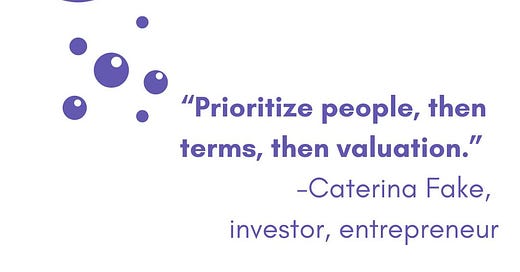The best advice I ever got: People, Terms, Valuation
Thanks to investor and serial entrepreneur Caterina Fake
A network I belong to shared a prompt this morning: “What’s the best advice you have ever received?” For more than 15 years, I have given one answer to this question:
“Prioritize people, then terms, then valuation.” -Caterina Fake
The context:
The year was 2007; the location was Caterina’s San Francisco home. Lisa Stone and I had gone up to see Caterina and get her advice on a big, important decision…whether or not to take outside venture capital, and really, with whom?
Caterina and her co-founder had sold their first start-up, Flickr, to Yahoo! The conventional wisdom was that they had sold early and could have gotten more if they had stuck with it longer. Back then, I probably agreed with conventional wisdom.
We (Lisa, Jory, and I) had been talking to multiple potential investors, all of them connected through warm ties. We had met with one group of guys we liked and who wanted to come in but didn‘t want to lead; we had met with an iconic woman investor who put herself out there to help us, but we weren’t a fit for her investing brief. And through that latter investor, we had met another investor who was dynamic, ready to act quickly, and with a blue chip VC firm, but had only just made the shift from investment banking to VC investing…we would be his first deal with the firm.
We felt like BlogHer was super community-driven and community-serving (as Flickr definitely was), so while we were confident that outside capital would help us deliver more value to the community we were building, we had also certainly seen the dot.com boom and bust in action, and knew that it was no small thing to bring outsiders into the vision and planning of the future of BlogHer. Because, by the way, we were very cognizant that when you take an investor’s money, you are signing up to deliver them a return. It’s not charity; it’s a commitment.
After a lot of chat about how she had made similar decisions and why the timing felt fortuitous, conventional wisdom be damned, Caterina suggested a framework by which we could assess potential investors in our companies by uttering the simple phrase I’ve called out: “Prioritize people, then terms, then valuation.”
It breaks down something like this:
People: You’re getting into a business marriage with your investor(s). You have to feel like you can trust them. Even more importantly, you should get the sense that they trust you. Every single start-up pivots at some point — you want investors who trust you to be the person to guide the company through that pivot. You don’t want to be pushed out at the first sign of a challenge. So, above all else…are these people you want to be business-married to for the foreseeable future? Do you have a good feeling about them? Have they shown you they’re all in on YOU, not just your current idea?
Then Terms over Valuation: These go together. When you sign an investment deal, pay attention to both. Don’t be seduced by a super high valuation without paying close attention to the terms (e.g. liquidation preferences or how much equity you’re selling) that stand between you ever seeing any part of that valuation. Whatever the eventual outcome, big or small, you want to feel like it was fair. Unfairness can really eat away at you (and ruin relationships). Not to mention that sometimes getting a fair share of a modest sum is better than getting no share of a big sum.
How does this relate to you if you’re not fundraising?
BlogHer raised several rounds, so we had more than one opportunity to apply Caterina’s advice to the specific kind of decision under consideration when the advice was given. However, I have also found that this advice is a good framework for making any decision involving partnership and value exchange.
Trying to decide whether to seal that partnership deal? Same framework applies. Good people and fair terms get you a lot closer to a valuable outcome and may just save you from premature gray hair or an ulcer. Ask me how I know.
Deciding whether to take a job offer? Same framework applies. If you haven’t figured out yet that bigger money can’t actually compensate you for toxic workplaces, and that toxic workplaces often find a way to sneak in terms that keep that big money away from you anyway, let me spare you from having to learn first hand!
Negotiating a client engagement or sale? You may feel like any sale is a good sale, but I swear to you, the framework applies. We have all had that client, purchaser, or customer who has cost you more than they brought in when you tally up time, tension, and tears.
So, here’s my question for you all: Can you remember a time when you’ve experienced “People then Terms then Valuation” in action?
And oh, by the way, what’s the best advice you’ve ever gotten???





